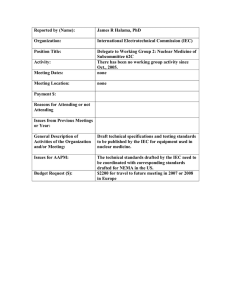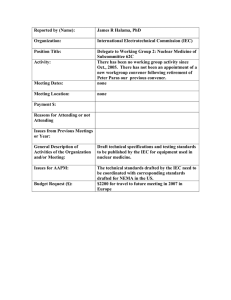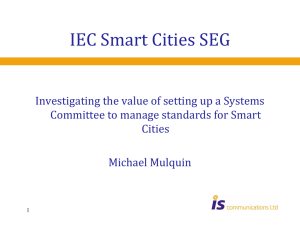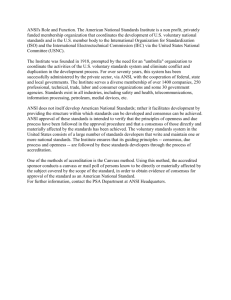U.S. NATIONAL COMMITTEE OF THE INTERNATIONAL
advertisement
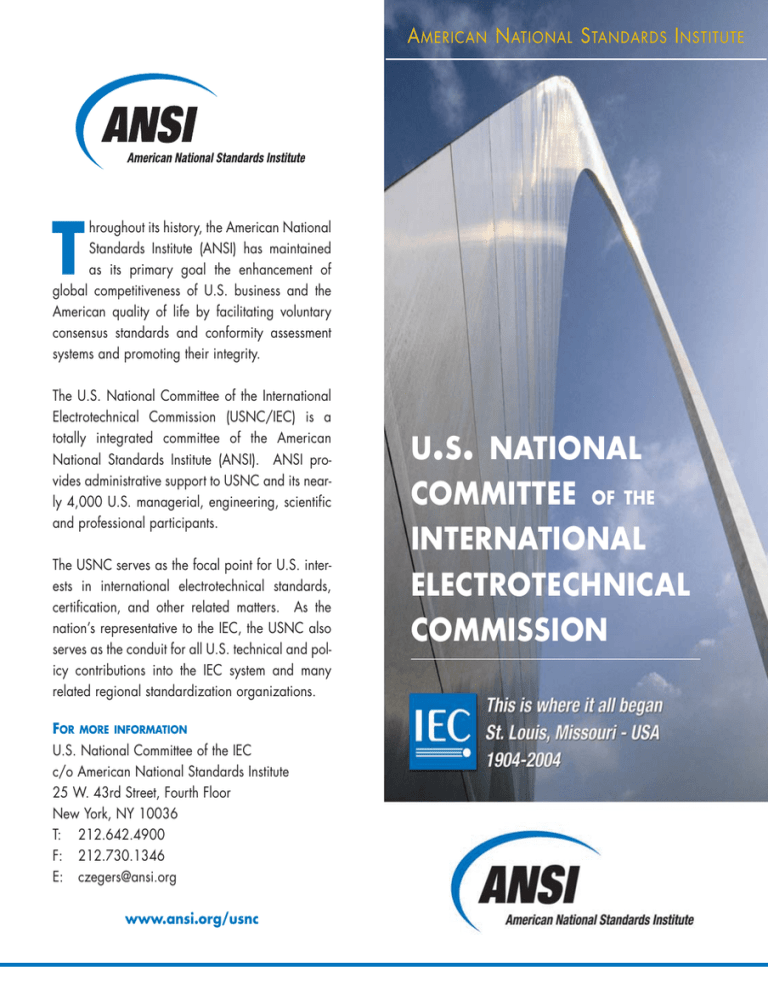
A MERICAN N ATIONAL S TANDARDS I NSTITUTE T hroughout its history, the American National Standards Institute (ANSI) has maintained as its primary goal the enhancement of global competitiveness of U.S. business and the American quality of life by facilitating voluntary consensus standards and conformity assessment systems and promoting their integrity. The U.S. National Committee of the International Electrotechnical Commission (USNC/IEC) is a totally integrated committee of the American National Standards Institute (ANSI). ANSI provides administrative support to USNC and its nearly 4,000 U.S. managerial, engineering, scientific and professional participants. The USNC serves as the focal point for U.S. interests in international electrotechnical standards, certification, and other related matters. As the nation’s representative to the IEC, the USNC also serves as the conduit for all U.S. technical and policy contributions into the IEC system and many related regional standardization organizations. FOR MORE INFORMATION U.S. National Committee of the IEC c/o American National Standards Institute 25 W. 43rd Street, Fourth Floor New York, NY 10036 T: 212.642.4900 F: 212.730.1346 E: czegers@ansi.org www.ansi.org/usnc U.S. NATIONAL COMMITTEE OF THE INTERNATIONAL ELECTROTECHNICAL COMMISSION For more information, please visit www.ansi.org/usnc A t a September 1904 meeting in St. Louis, Missouri, leading scientists and pioneering industrialists from around the globe launched efforts that led to the establishment in 1906 of the International Electrotechnical Commission. Commonly known as the “IEC,” the Commission promotes international cooperation on all questions of standardization and related matters in the fields of electricity, electronics and related technologies. Today, internationally recognized and technically relevant standards make it clear how to improve the safety of products for the protection of consumers, support the worldwide sale of products, and prevent non-tarriff technical barriers to trade. Representing U.S. interests globally The U.S. National Committee was formed in 1907 to serve as both the U.S. link to the IEC and as the primary U.S. electrotechnical industry interface with regional standards bodies. The USNC is a staunch advocate for standards that are based on the principles of the World Trade Organization Technical Barriers to Trade (WTO/TBT) Agreement, including consensus, openness, balance, impartiality, transparency, due process (including prompt appeal), flexibility, global relevance, coherence and timeliness. A private and public sector partnership In addition to coordinating U.S. technical and policy decisions, the USNC also helps to facilitate communications between industry sectors. More than four thousand representatives of industry, scientific and professional organizations, and government agencies are involved in USNC-coordinated activities. USNC roles and responsibilities Q Serve as the American National Standards Institute’s contact with the general public, government and industry in the area of standards and conformity assessment programs for goods and services impacting the electrotechnical community. Q Encourage industry participation in the development of standards for products and services that must meet the sector’s needs. Q Enhance relationships among national and international organizations to encourage diversity and increased participation in standards development efforts. Q Develop, or encourage development of, outreach programs for U.S. policy and standards development activities that are of interest to the electrotechnical sector, and that require their support and encouragement for maximum effectiveness. Q Dialogue on key issues and facilitate effective information exchanges among industry professionals. Q Represent U.S. interests at the IEC. Q Recommend to appropriate bodies the development of standards or standards programs important to the advancement of electrotechnical interests. Q Help to achieve effective representation in standards development activities by providing guidance to the ANSI Board of Directors on policy and procedures that affect the electrical and electronics industry. Q Advance efforts to make the international standards system more flexible, effective and costefficient.
